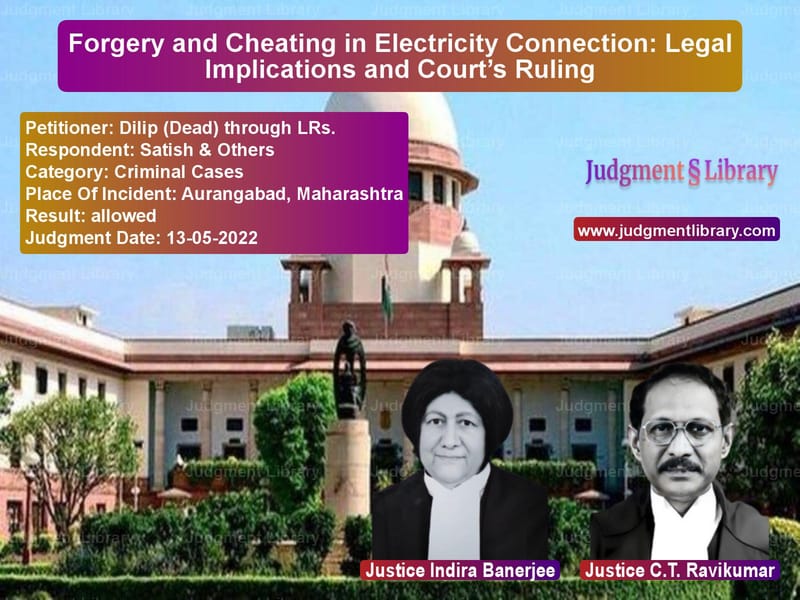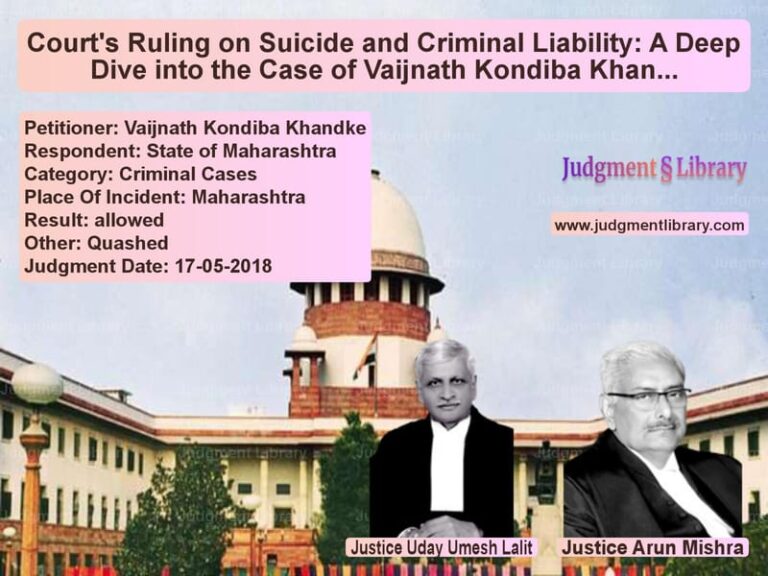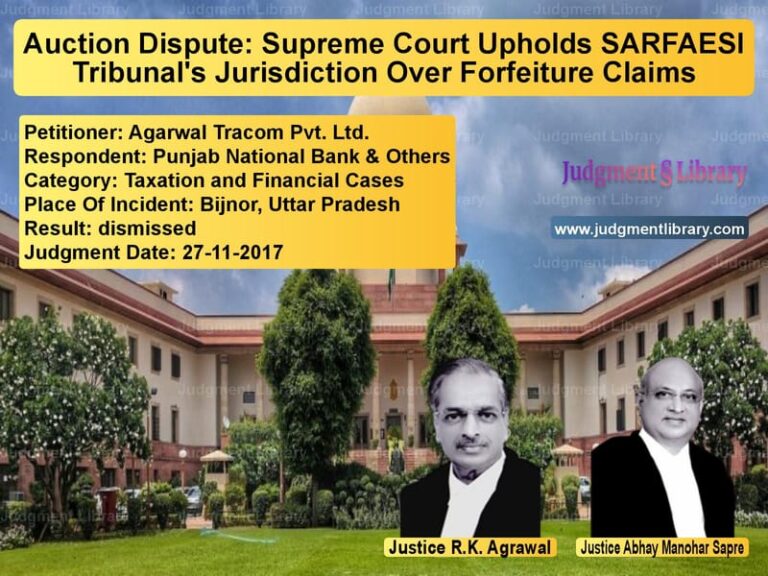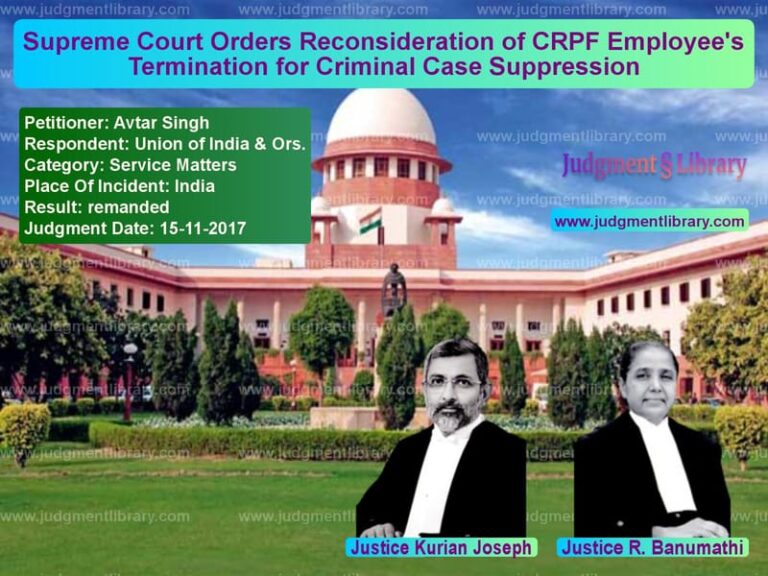Forgery and Cheating in Electricity Connection: Legal Implications and Court’s Ruling
This case concerns the appeal filed by the State against a decision made by the High Court of Bombay at Aurangabad, which had quashed an FIR filed by the appellant. The appellant, Dilip, had filed the FIR against Satish and others, alleging that they had forged a No Objection Certificate (NOC) to obtain an electricity connection for a shop. The core issue in this case revolves around whether the act of obtaining an electricity connection through a forged NOC constituted a criminal offense under the Indian Penal Code (IPC), specifically cheating and forgery.
Petitioner’s Arguments
The petitioner, Dilip, who is the landlord of the property in question, argued that the respondents had illegally obtained an electricity connection using a forged No Objection Certificate (NOC). The petitioner claimed that Satish, the tenant, had forged the signature of his brother to prepare the NOC. The FIR lodged by the petitioner stated that the act of forging documents and obtaining a new electricity connection was done with the intention to deceive the authorities and the landlord. The petitioner contended that this act of forging the NOC and the subsequent obtaining of an electricity connection amounted to cheating under Section 415 and forgery under Section 463 of the IPC.
The petitioner further claimed that despite repeated attempts to inform the relevant authorities about the fraudulent nature of the NOC, no action was taken initially. The FIR was filed after the illegal connection was discovered, and the petitioner insisted that the criminal actions of the accused should be investigated and prosecuted to prevent further misuse of forged documents.
Respondent’s Arguments
The respondents, represented by their counsel, argued that the complaint filed by the petitioner was without merit and should be dismissed. They contended that obtaining an electricity connection through a forged NOC did not amount to a criminal offense under the IPC. They argued that the actions of obtaining the connection were done in good faith and that the landlord’s refusal to provide the NOC was the sole reason behind the situation.
Additionally, the respondents emphasized that the forged NOC did not cause any harm to the property or person of the petitioner, and hence, there was no material evidence to substantiate the charges of cheating or forgery. They argued that the actions taken by the tenant were simply a means of obtaining a necessary utility for running a business, and thus, the charge of forgery should not be applied in this case. They further highlighted that the electricity supply had been connected, and no further harm had occurred as a result.
Court’s Analysis and Conclusion
The Supreme Court analyzed the case, focusing primarily on the legal definitions of forgery and cheating as outlined in the Indian Penal Code. The Court noted that under Section 415 of the IPC, cheating involves deceiving someone fraudulently to gain property or any valuable security. It was observed that the creation of a false document (in this case, the forged No Objection Certificate) with the intent to deceive the authorities and obtain an electricity connection clearly fulfilled the criteria for cheating under the IPC.
The Court further examined the provisions related to forgery under Section 463 of the IPC, which criminalizes the act of making a false document with the intent to cause harm or to deceive others. The Court found that the respondents had indeed fabricated the No Objection Certificate to unlawfully obtain an electricity connection, which amounted to forgery under the law.
The Supreme Court pointed out that the High Court had erred in dismissing the FIR, as it failed to recognize that the act of forgery and subsequent deception in obtaining the electricity connection did constitute a criminal offense. The Court emphasized that the legal framework for punishing such fraudulent acts was well established and must be enforced to prevent misuse of public services and to protect the interests of the individuals involved.
Final Decision
The Supreme Court ruled in favor of the petitioner, overturning the High Court’s decision to quash the FIR. The Court held that the act of obtaining an electricity connection through a forged No Objection Certificate constituted both cheating and forgery under the Indian Penal Code. The Court directed that the FIR be reinstated and that the respondents be subjected to legal proceedings for their actions. However, the Court also stated that the electricity supply, which had been connected to the premises, should not be disconnected, provided that the respondents complied with the terms and conditions set by the electricity department, including payment of charges for the supply.
Petitioner Name: Dilip (Dead) through LRs..Respondent Name: Satish & Others.Judgment By: Justice Indira Banerjee, Justice C.T. Ravikumar.Place Of Incident: Aurangabad, Maharashtra.Judgment Date: 13-05-2022.
Don’t miss out on the full details! Download the complete judgment in PDF format below and gain valuable insights instantly!
Download Judgment: dilip-(dead)-through-vs-satish-&-others-supreme-court-of-india-judgment-dated-13-05-2022.pdf
Directly Download Judgment: Directly download this Judgment
See all petitions in Fraud and Forgery
See all petitions in Theft and Robbery Cases
See all petitions in Custodial Deaths and Police Misconduct
See all petitions in Judgment by Indira Banerjee
See all petitions in Judgment by C.T. Ravikumar
See all petitions in allowed
See all petitions in supreme court of India judgments May 2022
See all petitions in 2022 judgments
See all posts in Criminal Cases Category
See all allowed petitions in Criminal Cases Category
See all Dismissed petitions in Criminal Cases Category
See all partially allowed petitions in Criminal Cases Category







